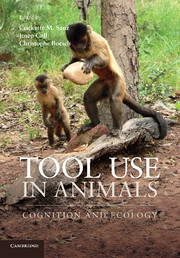Tool Use in Animals Cognition and Ecology
Langue : Anglais
Coordonnateurs : Sanz Crickette M., Call Josep, Boesch Christophe

Presentation of groundbreaking research on an extensive range of tool using animals, looking particularly at the evolution of cognitive abilities.
The last decade has witnessed remarkable discoveries and advances in our understanding of the tool using behaviour of animals. Wild populations of capuchin monkeys have been observed to crack open nuts with stone tools, similar to the skills of chimpanzees and humans. Corvids have been observed to use and make tools that rival in complexity the behaviours exhibited by the great apes. Excavations of the nut cracking sites of chimpanzees have been dated to around 4-5 thousand years ago. Tool Use in Animals collates these and many more contributions by leading scholars in psychology, biology and anthropology, along with supplementary online materials, into a comprehensive assessment of the cognitive abilities and environmental forces shaping these behaviours in taxa as distantly related as primates and corvids.
List of contributors; Part I. Cognition of Tool Use: 1. Three ingredients for becoming a creative tool-user J. Call; 2. Ecology and cognition of tool use in chimpanzees C. Boesch; 3. Chimpanzees plan their tool use R. W. Byrne, C. M. Sanz and D. B. Morgan; Part II. Comparative Cognition: 4. Insight, imagination and invention: tool understanding in a non-tool-using corvid N. Emery; 5. Why is tool use rare in animals? G. Hunt, R. Gray and A. Taylor; 6. Understanding differences in the way human and non-human primates represent tools: the role of teleological-intentional information A. M. Ruiz and L. R. Santos; 7. Why do woodpecker finches use tools? S. Tebbich and I. Teschke; Part III. Ecology and Culture: 8. The social context of chimpanzee tool use C. M. Sanz and D. B. Morgan; 9. Orangutan tool use and the evolution of technology E. J. M. Meulman and C. P. van Schaik; 10. The EthoCebus project: stone tool use by wild capuchin monkeys E. Visalberghi and D. Fragaszy; Part IV. Archaeological Perspectives: 11. From pounding to knapping: how chimpanzees can help us model hominin lithics S. Carvalho, T. Matsuzawa and W. C. McGrew; 12. Early hominin social learning strategies underlying the use and production of bone and stone tools M. Caruana, F. d'Errico and L. Backwell; 13. Perspectives on stone tools and cognition in the early paleolithic record S. P. McPherron; Index.
Crickette Sanz is an Assistant Professor in Anthropology at Washington University, St Louis, where she teaches courses on primate behaviour and human evolution. She is one of the principal investigators of the Goualougo Triangle Ape Project, which focuses on studying and conserving sympatric central chimpanzee and western lowland gorilla populations.
Josep Call is a comparative psychologist specialising in primate cognition at the Max Planck Institute for Evolutionary Anthropology. He is also the co-founder of the Wolfgang Kohler primate research centre and has an extensive back catalogue of works including 3 books and nearly 200 peer-reviewed articles.
Christophe Boesch is Director of the Max Planck Institute of Evolutionary Anthropology's primatology department. His work covers many areas of chimpanzee biology which he has used to further understanding of the evolution of cognitive and cultural abilities in humans. He is also the founder and president of the Wild Chimpanzee Foundation.
Josep Call is a comparative psychologist specialising in primate cognition at the Max Planck Institute for Evolutionary Anthropology. He is also the co-founder of the Wolfgang Kohler primate research centre and has an extensive back catalogue of works including 3 books and nearly 200 peer-reviewed articles.
Christophe Boesch is Director of the Max Planck Institute of Evolutionary Anthropology's primatology department. His work covers many areas of chimpanzee biology which he has used to further understanding of the evolution of cognitive and cultural abilities in humans. He is also the founder and president of the Wild Chimpanzee Foundation.
Date de parution : 03-2014
Ouvrage de 324 p.
17x24.4 cm
Date de parution : 03-2013
Ouvrage de 324 p.
18x24.9 cm
Thèmes de Tool Use in Animals :
© 2024 LAVOISIER S.A.S.



